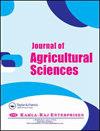Perception of maize processors towards utilization of maize value addition techniques: implications for rural entrepreneurship development - a study in Nigeria.
IF 0.7
Q3 AGRICULTURE, MULTIDISCIPLINARY
引用次数: 1
Abstract
Purpose: Huge losses in maize production lead to reduction in farmers’ income and food insecurity. However, it is expected that the value chain approach would provide processors with actionable methods capable of increasing productivity and income. However, maize producers and processors in the study area are still faced with post-harvest wastages and limited products along maize value chain; Hence, the study. Research Method: The data for this study were gathered through an interview schedule from 120 maize processors in Nigeria. Appropriate descriptive and inferential statistical tools such as frequency counts, means, standard deviations chi-square and correlation analyses were used to analyze the data Findings: The results revealed that majority were female with the mean monthly income was N 51,000.33. A total of 17 value addition techniques were identified and indigenous ones include pap making (39.5%) and solid gel making (32.5%). Majority were small scale local processors producing for their immediate communities and where almost equal numbers of processors were operating either on part time or full time basis. 56.7% had a favorable perception towards the utilization of maize value addition techniques. Sex and occupation had a significant association while years of schooling and income had significant relationships with the perception towards the utilization of maize value addition. Research limitations: The study was limited in that it did not cover all the geographical zones in Nigeria since there was no grant to support the research. Originality/value: The study identified different maize value addition techniques utilized by the processors and the characteristics of the enterprise in the study area.玉米加工商对利用玉米增值技术的看法:对农村创业发展的影响-尼日利亚的一项研究。
目的:玉米生产的巨大损失导致农民收入减少和粮食不安全。然而,预计价值链方法将为加工商提供能够提高生产率和收入的可行方法。然而,研究地区的玉米生产者和加工者仍然面临着收获后浪费和玉米价值链上产品有限的问题;因此,有了这项研究。研究方法:本研究的数据是通过对尼日利亚120个玉米加工商的访谈计划收集的。采用频率计数、均值、标准差卡方和相关分析等描述性和推断性统计工具对数据进行分析。结果显示,女性居多,平均月收入为510000.33 N。共鉴定出17种增值技术,其中本土技术包括pap制造(39.5%)和固体凝胶制造(32.5%)。大多数是小规模的当地加工者,为他们附近的社区生产,几乎相同数量的加工者在兼职或全职的基础上工作。56.7%的农户对玉米增值技术的利用持积极态度。性别和职业对玉米增值利用的感知有显著相关性,而受教育年限和收入对玉米增值利用的感知有显著相关性。研究局限性:这项研究的局限性在于它没有涵盖尼日利亚的所有地理区域,因为没有资助这项研究。原创性/价值:研究确定了研究区域内加工者使用的不同玉米增值技术和企业的特点。
本文章由计算机程序翻译,如有差异,请以英文原文为准。
求助全文
约1分钟内获得全文
求助全文
来源期刊

Journal of Agricultural Sciences
AGRICULTURE, MULTIDISCIPLINARY-
CiteScore
1.80
自引率
0.00%
发文量
0
 求助内容:
求助内容: 应助结果提醒方式:
应助结果提醒方式:


